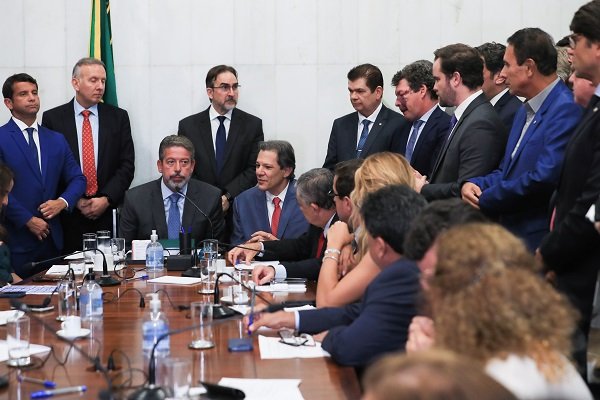The dispute between the Executive and the Legislative in Brazil is a recurring and complex theme, reflecting the political and institutional tensions present in the country. Recently, a series of events has highlighted the ongoing struggle for power and resources between these government branches. First, the government achieved a small victory by postponing the Congress session, originally scheduled for Wednesday (24/04), intended to analyze presidential vetoes. This postponement avoided a possible defeat in several projects and provided more time to negotiate the release of parliamentary amendments, a controversial issue in Congress. At the same time, the dispute over payroll tax relief for certain sectors was taken to the Federal Supreme Court (STF).
This Content Is Only For Subscribers
To unlock this content, subscribe to INTERLIRA Reports.
Negotiation of Ministers
The decision to postpone was taken after a series of meetings between government members and Congress leaders, with the direct involvement of ministers in the negotiations, including Rui Costa (Casa Civil) and Alexandre Padilha (Secretariat of Institutional Relations). The government was unable to settle the agenda or reach an agreement regarding Lula’s veto of the R$5.6 billion reserved in this year’s Budget for the payment of commission amendments, which is quite important for projects in the electoral base of Congressmen.
Atmosphere Continues Bad
The postponement of the National Congress session to analyze presidential vetoes was a victory for the Lula (PT) government but did not indicate an improvement in tensions between the Executive and Parliament. The impasse arose due to allegations of non-compliance with agreements by the senators in relation to Lula’s veto of R$5.6 billion for commission amendments, while the senators argue that the postponement occurred due to the lack of consideration in the Senate of a project that releases more than R$15 billion for President Lula, with opposition from some parliamentarians who wish to prioritize the payment of repressed amendments.
Dispute over Funds
The fight between the Executive and the Legislative to determine the allocation of public funds appears to be a perennial dispute, said on Wednesday (24/04) the president of the Federal Chamber, Arthur Lira (PP-AL). For him, these divergences are inherent to debates on public policies and constitute an essential characteristic of democracy. However, Lira maintains a tense relationship with the Federal Government, going so far as to publicly criticize the competence of the Institutional Relations Minister Alexandre Padilha (PT-SP), and express dissatisfaction with the political articulation of the Lula government (PT).
Recommended by Lira (PP)
On Thursday (25/04), the Lula government (PT) appointed the new regional superintendent of Incra in Alagoas, following the nomination of the president of the Chamber of Deputies, Arthur Lira (PP-AL). Junior Rodrigues do Nascimento took office replacing Wilson César de Lira Santos, Lira’s cousin, who was dismissed the previous week at the request of the MST (Landless Rural Workers Movement). The MST had been demanding the replacement of Lira’s cousin by Rodrigues since the beginning of the Lula government.
Government Appeal to the STF
Lula’s government filed a lawsuit in the STF seeking the unconstitutionality of the law that extended the payroll exemption for 17 sectors and cut the social security rate for city halls. Approved by Congress and overturning the presidential veto, the measure was challenged by the government, arguing that it violated the Fiscal Responsibility Law and the Constitution.
Congress Must Appeal
The president of the Senate and Congress, Rodrigo Pacheco (PSD-MG), said he will appeal the decision of minister Cristiano Zanin, of the Federal Supreme Court (STF), who suspended the payroll tax exemption for labor-intensive sectors. Pacheco stated that the extension of the exemption is constitutional and cited the STF’s precedents in favor of extending the measure.
Analysis:
It is undeniable that the disputes between the Executive and Legislative powers in Brazil reflect the country’s complex political and institutional dynamics. This week’s events highlight an ongoing struggle for power and resources between these branches of government, showing the importance of negotiation and political articulation to achieve political objectives, especially with some strategic groups connected to the Congress Presidency.
In the case of payroll exemptions for some sectors of the economy and the possible institution of another exemption, the Federal Supreme Court will probably give victory to the Lula government. Four ministers have already spoken out in favor of ending the exemptions. It is unlikely that there will be a request for a review, since, with an injunction suspending the exemptions, postponing the case would not give Congress time, but would maintain the decision in favor of the government. Given the impasse between the government and Congress, it is up to the STF to fulfill its role of exercising constitutionality control.




